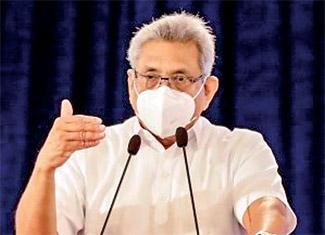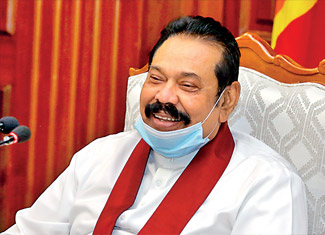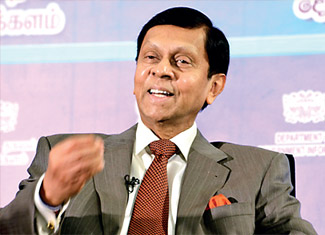Sunday Feb 01, 2026
Sunday Feb 01, 2026
Monday, 2 August 2021 00:04 - - {{hitsCtrl.values.hits}}

President Gotabaya Rajapaksa

Prime Minister Mahinda Rajapaksa

State Minister Nivard Cabraal
 Sri Lanka has maintained its painful record so far, of settling international debt obligations by honouring $ 1 billion of its International Sovereign Bonds, which matured a few days ago, leaving another $ 13 billion to be settled between 2022 and 2029.
Sri Lanka has maintained its painful record so far, of settling international debt obligations by honouring $ 1 billion of its International Sovereign Bonds, which matured a few days ago, leaving another $ 13 billion to be settled between 2022 and 2029.
State Minister of Finance, Capital Markets and State Enterprise Reforms Nivard Cabraal claimed with some justification that the way the monetary authorities had accomplished this task by carefully balancing foreign reserves with international cashflows, has proved wrong the dire prediction of doomsayers and accused them of causing unnecessary panic among investors. He also criticised the international credit rating agencies for their unfair threat to downgrade further Sri Lanka’s credit reputation.
After paying the $ 1 billion, the country is now left with close to $ 3 billion Forex reserves, and the minster expects that amount to swell to $ 7 billion in a few months, with increasing inflow of cash via currency swaps, loans and IMF’s Special Drawing Rights. In spite of all this self-adulation, an undisputable fact is that, the debt burden will continue to make economic development increasingly difficult especially in the prevailing environment of pandemic and global depression.
Whichever way the inflow comes, at the end of the day, all inward cashflows represent some form of debt, which have to be serviced and settled in the future. The country’s debt burden is snowballing, and there is no end in sight for a debt-free Sri Lanka, certainly not within the term of the present regime, and probably even long after that, unless the country makes a U-turn in its approach towards managing the twin deficits, Balance of Payments and domestic budget.
Economics after all is nothing but common sense made into rigorous punditry. Lending and borrowing are part of ordinary human life. It is natural for those who have less to borrow from those with plenty in the hope that the borrower would settle the debt by earning more and saving more in the future. Unless the borrower works hard, avoids extravagance, manages his/her personal budget and acquires surplus, he/she would never be debt free. What is true of an individual or a family is also true of a nation.
The crucial question therefore, is, what prevents Sri Lanka from earning a surplus? It is in answering that question, several independent observers and public intellectuals on economic and financial matters are warning that the country is heading towards an economic crash unless the Government and its policymakers revise their development strategies to allow pragmatism and not idealism to prevail. To ridicule these people as doomsayers is not only cheap politics but also reflects the authority’s stubborn refusal to entertain constructive criticisms, a hallmark of authoritarian regimes.
The current pandemic is not going to retreat soon, and the economic crisis it has engendered is crippling growth and development the world over. Even rich countries like Australia are facing trillion-dollar budget deficits, and they estimate that it would take decades before bringing budgets to surplus. National budgeting to balance various needs has become an excruciatingly painful exercise to treasurers, and that is why for small open economies like Sri Lanka annual budgets should be part of a carefully structured medium or long-term plan.
It is in drawing up this plan that pragmatism should play the decisive role. Without such a plan of coordinated action, attempts to sell false visions of prosperity and splendour to a population driven to the brink of starvation and misery, is sheer acts of delusion and skulduggery.
Rulers are making policies on the run without doing their homework to study the consequences and difficulties those policies would cause to the economy at its micro and macro levels. The most glaring example of a policy on the run was the President’s decision to force farmers to switch overnight to the use of organic fertiliser by banning the import of its chemical variant.
Although the openly proclaimed objective of this policy is a noble one, and that is to stop the damage done – since the onset of the so-called Green Revolution (GR) of 1960s and 1970s about which more soon – to natural fertility of arable land, the real reason behind its immediate implementation is to conserve precious foreign exchange. If one recalls the various measures announced by this Government and its monetary authorities, since 2020, to attract the inflow of hard currency, including their tolerance for money laundering, one could realise the extent of the regime’s desperation.
All import bans, from turmeric to fertiliser and from luxuries to intermediate goods, in the name of self-sufficiency and chemical-free environment are basically motivated by the urgent desire to strengthen the country’s foreign reserves. However, the linkage effects of these decisions on various sectors of the economy have been blatantly ignored.
GR was introduced by agrochemical industries in the 1950s and 1960s, with blessings from US and other Western governments as a response to the socialist remedy of radical land and tenancy reforms and use of appropriate technology to increase food production in developing countries. In a sense, it was another dimension of the then raging cold war. As a result, industry funded research centres like the Rice Research Institute in Philippines came out with new varieties of seed grains like the IR-8 paddy, which responded vigorously to agrochemical inputs.
Even though several heterodox economists and scientists at that time warned of the long-term damage chemical fertilisers and other inputs like weedicide and insecticide would cause to natural nutrients of soil and environment those concerns were callously disregarded. Sri Lanka, like many other developing nations, embraced GR, and today humanity is facing the adverse consequences of depleting fertility of soil and irreparable damage to environment.
However, one of the consequences of GR was the disappearance of traditional varieties of seed paddy that responded effectively to organic fertiliser. The varieties of seed paddy sown today are tuned to consume chemically oriented inputs like the popular Urea. Where is the alternative seed that would respond to organic fertiliser? Where is the research along this line? Thus, without providing that alternative how could any responsible government ban import of chemical fertilisers overnight? Also, what arrangements have been done to increase domestic production of organic fertiliser? Or, is that also going to be imported from somewhere, preferably from China?
A pragmatic way of implementing this policy is to apply a gradualist approach. As local production of organic fertiliser increases in quantity imports of chemical fertiliser could be scaled down in response, and at the point of self-sufficiency imports could be stopped completely. No wonder farmers are up in arms and protesting. Soon the country may witness a fall in domestic production of rice, which would increase the price of that staple and would necessitate rice imports. This is what policies on the run do and this is why coordinated planning is required.
Another example of policies on the run is Prime Minister Mahinda Rajapaksa’s (MR) announcement that 100 cities would be beautified. MR is noted for spending borrowed money on prestigious infrastructure projects, a few of which had turned out to be white elephants. The Mattala airport and Hambantota cricket stadium are shining examples of his infrastructure profligacy.
At a time when the Government is faced with falling revenue and accumulating foreign debt should expenditure on beautification receive priority? Has any study been done on the environmental impact of city beautification? Floods and earth slips, water shortage and power cuts became endemic since Mahinda Presidency (2005-2015) embarked on its Highway and Express Way projects without caring for the environment. It appears that he is a slow learner.
If policies on the run, which are full of contradictions, are the contents of the script written for the much touted ‘alternate way’ for economic growth and development, then its authors are deluding themselves and the nation. Earning a national surplus and to free the country from debt require more than economics.
Eradicating corruption and jobs for the boys, removing market rigidities by clamping down the operation of market mafias, and demilitarisation of civilian administration are all linked to economic development. It is therefore time to change either the prevailing economic strategies or strategists themself.
(The writer is attached to the School of Business and Governance, Murdoch University, Western Australia.)